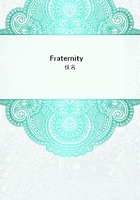
第33章
He passed his study door, and halted at Mr. Stone's; the thought of the old man, so steady and absorbed in the face of all external things, refreshed him.
Still in his brown woollen gown, Mr. Stone was sitting with his eyes fixed on something in the corner, whence a little perfumed steam was rising.
"Shut the door," he said; "I am making cocoa; will you have a cup?""Am I disturbing you?" asked Hilary.
Mr. Stone looked at him steadily before answering:
"If I work after cocoa, I find it clogs the liver.""Then, if you'll let me, sir, I'll stay a little.""It is boiling," said Mr. Stone. He took the saucepan off the flame, and, distending his frail cheeks, blew. Then, while the steam mingled with his frosty beard, he brought two cups from a cupboard, filled one of them, and looked at Hilary.
"I should like you," he said, "to hear three or four pages I have just completed; you may perhaps be able to suggest a word or two."He placed the saucepan back on the stove, and grasped the cup he had filled.
"I will drink my cocoa, and read them to you."Going to the desk, he stood, blowing at the cup.
Hilary turned up the collar of his coat against the night wind which was visiting the room, and glanced at the empty cup, for he was rather hungry. He heard a curious sound: Mr. Stone was blowing his own tongue. In his haste to read, he had drunk too soon and deeply of the cocoa.
"I have burnt my mouth," he said.
Hilary moved hastily towards him: "Badly? Try cold milk, sir."Mr. Stone lifted the cup.
"There is none," he said, and drank again.
'What would I not give,' thought Hilary, 'to have his singleness of heart!'
There was the sharp sound of a cup set down. Then, out of a rustling of papers, a sort of droning rose:
"'The Proletariat--with a cynicism natural to those who really are in want, and even amongst their leaders only veiled when these attained a certain position in the public eye--desired indeed the wealth and leisure of their richer neighbours, but in their long night of struggle with existence they had only found the energy to formulate their pressing needs from day to day. They were a heaving, surging sea of creatures, slowly, without consciousness or real guidance, rising in long tidal movements to set the limits of the shore a little farther back, and cast afresh the form of social life; and on its pea-green bosom '" Mr. Stone paused. "She has copied it wrong,"he said; "the word is 'seagreen.' 'And on its sea-green bosom sailed a fleet of silver cockle-shells, wafted by the breath of those not in themselves driven by the wind of need. The voyage of these silver cockle-shells, all heading across each other's bows, was, in fact, the advanced movement of that time. In the stern of each of these little craft, blowing at the sails, was seated a by-product of the accepted system. These by-products we should now examine.
Mr. Stone paused, and looked into his cup. There were some grounds in it. He drank them, and went on:
"'The fratricidal principle of the survival of the fittest, which in those days was England's moral teaching, had made the country one huge butcher's shop. Amongst the carcasses of countless victims there had fattened and grown purple many butchers, physically strengthened by the smell of blood and sawdust. These had begotten many children. Following out the laws of Nature providing against surfeit, a proportion of these children were born with a feeling of distaste for blood and sawdust; many of them, compelled for the purpose of making money to follow in their fathers' practices, did so unwillingly; some, thanks to their fathers' butchery, were in a position to abstain from practising; but whether in practice or at leisure, distaste for the scent of blood and sawdust was the common feature that distinguished them. Qualities hitherto but little known, and generally despised--not, as we shall see, without some reason--were developed in them. Self-consciousness, aestheticism, a dislike for waste, a hatred of injustice; these--or some one of these, when coupled with that desire natural to men throughout all ages to accomplish something--constituted the motive forces which enabled them to work their bellows. In practical affairs those who were under the necessity of labouring were driven, under the then machinery of social life, to the humaner and less exacting kinds of butchery, such as the Arts, Education, the practice of Religions and Medicine, and the paid representation of their fellow-creatures.